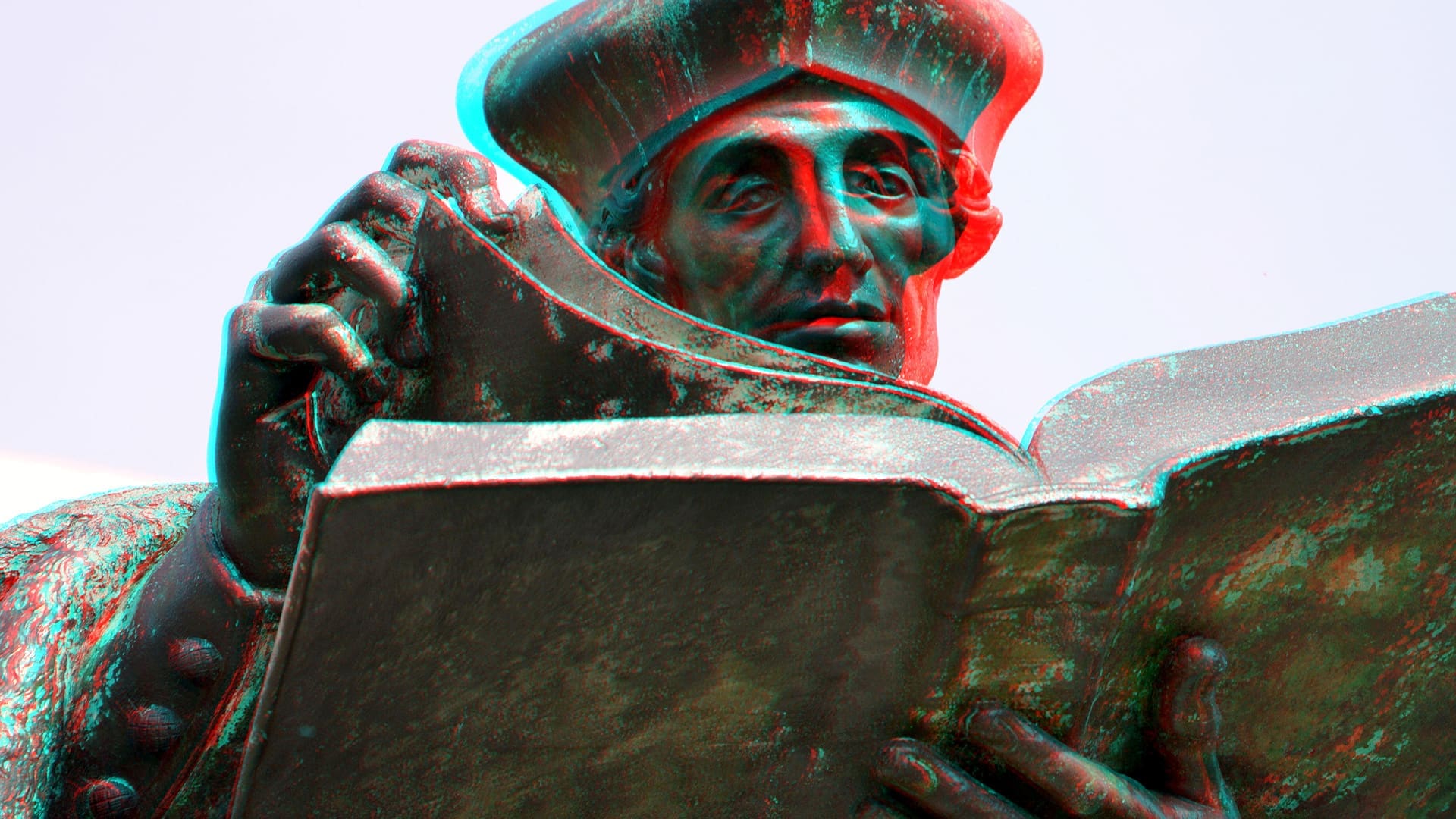D
Desiderius Erasmus of Rotterdam (1467-1536)—Renaissance humanist, writer, editor, translator, and the centre of an extended circle of a gifted thinkers and artists—is my hero, and I want him to be yours, too. In fact, I wish he could be named patron saint of the twenty-first century, so relevant to our time is his work and witness.
But he’s an extremely slippery fellow—you can’t reduce his achievement or his sensibility to a couple bullet points. Martin Luther famously referred to this problem when he said, “Erasmus is an eel,” meaning that he couldn’t easily be pinned down or caught.
That happens to be part of the attraction for me. We spend far too much of our time trying to label and categorize. Sometimes this impulse is just the necessary mental shorthand we rely on to get by in life, but sometimes it takes on a darker cast, especially when we reduce human beings and their works to parties, factions, and cliques (and pride ourselves on being in just the right set).
Erasmus the eel swam through the treacherous waters of an era riven by political, economic, and theological conflicts—call them “culture wars” if you like—that would become bloody and traumatic, breeding many of the problems of modernity that plague us still.
Some contemporary observers found liberating his fierce independence and ability to combine skepticism and biting satire with a deep commitment to traditional institutions and beliefs. Indeed, Erasmus was known throughout Europe. At the height of his fame, he would be welcomed into cities with elaborate processions and orations in his honour.
Others (including Luther) thought him too subtle and evasive and accused him of cowardice, especially when he ultimately chose not to side with the Reformation he had helped to inspire. Conservative Catholic theologians considered him a dangerous upstart—a literary meddler in matters of divinity. For the last decade of his life, he moved around Europe, trying to find a place to live where he would not be persecuted. After his death, much of his writing was put on the Catholic Church’s index of forbidden books.
Add to all this the fact that Erasmus did not leave behind books that we find easy to read. For one thing, he wrote in Latin rather than the vernacular, which means that no national literature claims him as its own (and so he gets left off the curriculum). And the literary forms he practiced are alien to our modern sensibilities: literary dialogues (which are neither plays nor short stories), satirical essays, handbooks to grammar and style, editions of ancient writers and church fathers, and collections of proverbs and sayings. (One anthology of his “greatest hits”—The Erasmus Reader—is published by . . . a university press.)
Another complication has made it difficult for later generations of Christian believers to appreciate the importance of Erasmus and his circle: the deeply embedded myth that the Renaissance was a time of rampant secularism and egotistical individualism that left the sweetness and piety of the Middle Ages behind.
This myth, perpetuated by nineteenth-century thinkers like Jacob Burckhardt, is itself a product of secular Enlightenment thought. The truth is that modern scholarship has demonstrated conclusively that there is far more continuity between Medieval and Renaissance periods than previously believed, including the centrality of Christian faith.
An excellent example of this revised understanding of the Renaissance concerns a word that has been much misunderstood: “humanism.” In recent decades, most religious believers have modified humanism with the word “secular,” signifying a worldview that substitutes man for God. This is to obscure and stigmatize a perfectly good term, one that Erasmus and his friends worked tirelessly to nurture and expound.
The origin of humanism lies in the disciplines of mind that explore what it means to be human—the disciplines that are concrete and rooted in experience rather than in abstract and philosophical. In short, humanism is closely related to what we call “the humanities,” which to the Renaissance meant grammar, rhetoric, poetry, history, and ethics. Each of these forms of thought engages the concrete particulars of language, events, and actions.
While we couldn’t think without abstractions, they are inherently dangerous things, liable to take on a life of their own and turn into the harsh systems of thought we call ideologies.
To the extent that humanism became a movement in the Renaissance, it was not merely an attack on disciplines like philosophy or theology, but an assertion of the need to both test and ground abstractions in human experience. Erasmus respected the intellectual achievement of St. Thomas Aquinas, but he was an unrelenting critic of what Aquinas’s followers (known as Scholastics) had done: reduce the Christian faith to dry doctrinal analyses and a fussy, puritanical moralism.
For Erasmus and company, humanism did not mean substituting man for God. But it did mean that human life possessed inherent dignity precisely because, in the Incarnation, God had chosen to unite human nature with the divine. Indeed, for Erasmus the Incarnation itself was the pattern of all knowledge: we only truly know the divine when we see it in the flesh and blood of Jesus Christ. Christ is the fullness of revelation.
Hence the pivotal role of literature. In great works of literary art we can discern the drama of a protagonist who is both made in God’s image and fallen. Writing that endures the test of time does so because it taps into the wellsprings of our human experience. That is why Gilgamesh and Aeschylus can touch us as deeply as Marilynne Robinson and Cormac McCarthy.
This is where another major element of the Renaissance era comes in: the recovery of classical antiquity. Humanists like Erasmus believed that pagan literature contained much of the best literature, art, and thought—and that, while not illuminated by revelation, it still revealed a great deal about this creature made in God’s image. To recover the depth and breadth of those achievements was not to endorse paganism but to emulate the children of Israel who had availed themselves of “the spoils of Egypt.” This way of thinking embraced the saying of an early church father, which held that “wherever there is truth, it is the Lord’s.”
Erasmus was well aware that many of the pious objected to the study of pagan works. In an early dialogue, “The Antibarbarians,” he has one of his characters opine:
These people say, “Am I to carry books by damned men in my hand and in my bosom, and read them over again and reverence them? Virgil is burning in hell, and is a Christian to sing his poems?” As if many a Christian were not burning there, too, whose writing—if any good ones survive— would not be shunned for that reason by anybody.
The Renaissance humanists believed in the need to return “Ad fontes“—to the ancient sources of human culture and thought, many of which come from pagan literature as well as the Bible. They did this not because they had a simplistic notion of turning back the clock, but because they understood G.K. Chesterton’s insight that any effort at “reform” means a “return to form,” which can often be seen in its purest form at the origin.
In short, their goal was always to forge an incarnational synthesis—between past and present, flesh and spirit, God and Caesar, head and heart.
For Erasmus and his colleagues, the core of humanism was a mastery of rhetoric—another word we moderns misunderstand and misuse. To our ears, rhetoric is a pejorative term, a reference to language that is manipulative and hollow. But in Western culture until about a hundred years ago, rhetoric was conceived as the noble art of matching the right words to the right circumstances and occasions.
Ancient thinkers like Cicero demonstrated that the purpose of rhetoric is to bridge the gap between head and heart—to not only bring reason to bear on a complex situation, but to make such reasoning concrete enough to move the heart. In short, rhetoric builds bridges between the intimate, personal realm of lyric poetry and the public arena of political struggle.
According to Jesuit scholar John W. O’Malley, the humanists felt that only in rhetoric could the powerful ideas of politics and theology (which can harden into ideology) be brought down to earth and framed in such a way as to move us. It was in the generation of Erasmus that literature and literary criticism began to emerge out of rhetoric as distinct (but related) fields. As O’Malley writes: “In poetry the reasons of the heart prevail, in a form of discourse that is more circular than linear. If culture two seeks clear-cut definition, this culture, at least in this particular aspect, glories in ambiguity, in rich layers of meaning.”
The crucial point here is that in these layers lies protection, not evasion. The great danger in social conflict comes from those Burckhardt (in one of his better insights) called “terrible simplifiers”—those who refuse to see the competing elements of truth in both sides of any clash. As O’Malley puts it: “Literature reflects the complexities of life and the murky darkness in which our choices must sometimes be made. It is a mirror held up to life that helps us make sense of our experience and sparks our moral imagination.”
Erasmus worked to persuade the more shrill voices of his era that his approach was precisely not evasiveness, nor an ivory tower retreat from reality, but a sustained, reflective engagement with the issues of the day. In fact, Erasmus and the humanists were widely known as reformers and activists. Their initial goal was of course to reform education, making rhetoric and literature, rather than Scholastic philosophy, the heart of the curriculum.
But they were also among the most articulate critics of the excesses of the late medieval Catholic Church. Erasmus railed against the superstitious, moralistic, and smug monks of his time, sending them up in his satirical masterpiece, The Praise of Folly. In typical Christian humanist fashion, he strove to find balance. He opposed the superstitiousness of his era by advocating a spirituality that was plain and simple, just as a contemporary Christian humanist might battle our politicized, rationalistic religion by stressing sacramentalism and mystery.
Erasmus went further: he produced a critical edition of the New Testament, showing that the Vulgate was riddled with errors. To point out that his own edition was also error-ridden is to miss the larger impact of the project. What he did was bold and unprecedented. With the humanist’s passion for textual accuracy and the power of the word, Erasmus helped to give birth to modern biblical criticism. Moreover, in his Paraclesis, or exhortation, at the outset of his New Testament, Erasmus called upon all Christians to learn the Bible: “I would hope that the farmer might chant a holy text at his plow, the spinner sing it as she sits at her wheel.”
No wonder the Reformers loved him. And Erasmus gave them encouragement, including Luther. But as the conflict escalated he felt increasingly torn. The Pope offered him a cardinal’s hat, hoping to enlist him against Luther and his followers. Erasmus refused it. But he also counselled Luther to work toward consensus rather than schism.
Eventually Erasmus felt that he had to publicly break with Luther, leading to their famous debate over free will. But Erasmus got little pleasure out of the conflict. Writing to Martin Bucer in 1527, he said: “I seem to see a cruel and bloody century ahead.” And yet the Reformation embraced the humanist model of education, ensuring that Erasmus’s legacy would live on in both wings of the church.
Though Erasmus died bitter and broken by this strife, it would be wrong to let that cast a pall over the vibrant efflorescence of literature and thought that was Renaissance Christian humanism. Stung by criticism, Erasmus could be waspish and resentful in response, but in some ways his greatest accomplishment was not in his writing but in his genius for friendship and what today we’d called “networking.”
As a friend, Erasmus was warm, playful, and loyal—as his network of devoted pals across Europe testified. In many ways he was the first pan-European intellectual—both in his travels and his prolific letter-writing he connected people from England to Italy and all points in between.
And what a gallery of friends he had. First and foremost, of course, was Thomas More: lawyer, author of the enigmatic Utopia, and eventually Lord Chancellor of England. Erasmus wrote The Praise of Folly in a few days while lying sick and awaiting More’s return from a trip. The Latin title is Encomium Moriae, which could also be translated as The Praise of More. It was in the foreword to that book that he spoke of More as “a man for all seasons.” Though the form of this satire is remote to our sensibilities, I’ve suggested elsewhere that if it is read like an extended stand-up comedy routine, the irony of the book becomes a little more accessible.
Then there was the painter Hans Holbein the Younger, who became enamoured of Erasmus and painted him repeatedly. Eventually Erasmus would send him to the English court, where he would paint Thomas More. Holbein’s immersion in Renaissance humanism helped make him one of the greatest portraitists of his own time, or any other.
Johannes Reuchlin, the brilliant scholar of Hebrew and Chaldean, got caught up in a wrenching controversy, just as his friend Erasmus did. When consulted by the Vatican, Reuchlin argued vigorously against various forms of persecuting Jews, only to be accused of heresy by the anti-Semitic party in the church. And yet his work helped pave the way toward deeper Christian-Jewish understanding.
In Spain, Juan Luis Vives, whom Erasmus knew and also praised, wrote many works, including The Education of a Christian Woman, which argued for the universal education of women, the essential role of friendship in marriage (rather than mere procreation), and held that women were the intellectual equal, if not superior, to men. (Thomas More’s daughter, Margaret, is widely considered the most educated woman of her time.)
Many more fascinating thinkers could be added to this list. If James Davison Hunter is correct when he writes in his recent book To Change the World that “the key actor in history is not individual genius but rather the network and the new institutions that are created out of that network,” then Erasmus deserves far more attention and credit than he currently does in either the academy or the Christian community. Erasmus intuitively fostered such a dense network, cementing it with the generosity of his friendship.
At the outset of this essay I cited Martin Luther on Erasmus but I provided only the first half of the quotation. The full statement is this: “Erasmus is an eel—only Christ can catch him.” We may never know the full intent behind Luther’s words, but to my mind, they constitute the greatest compliment imaginable. For all his slipperiness and obscurity, Erasmus deserves to be better known—and even revered—as a hero of incarnational faith and the imaginative life.






